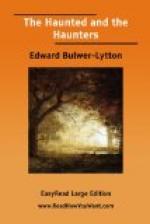to that which Charles had opened. Behind them
a man of vigrous mould held the extremity of the cord
with which their hands were pinioned. The prisoner
who marched in the foremost rank, and whose air was
more imposing than that of the others, stopped in the
midst of the council-chamber before the block which
he seemed to contemplate with haughty disdain.
At the same instant the corse seated on the throne
was agitated by a convulsive tremor, and the purple
tide flowed afresh from his wounds. The youthful
prisoner knelt upon the ground, and laid his head
upon the block; the fatal axe glittering in the air
descended swiftly; a stream of blood forced its way
even to the platform of the throne, and mingled with
that of the royal corse; whilst the head of the victim,
rebounding from the crimson pavement, rolled to the
feet of Charles, and stained them with blood.
Hitherto, astonishment had rendered the monarch dumb;
but at this horrid spectacle his tongue was unloosed.
He advanced a few steps towards the platform, and addressing
himself to the apparition on the left of the corse,
boldly pronounced the customary abjuration, “If
thou art of God, speak; if of the Evil One, depart
in peace.” The phantom replied in slow and
emphatic accents, “Charles, not under thy reign
shall this blood be shed [here the voice became indistinct];
five monarchs succeeding thee shall first sit on the
throne of Sweden. Woe, woe, woe to the blood of
Wasa!” Upon this the numerous figures composing
this extraordinary assemblage became less distinct,
till at last they resembled a mass of coloured shadows,
soon after which they disappeared altogether.
The fantastic torches were extinguished of themselves,
and those of Charles and his suite cast their dim,
flickering light upon the old-fashioned tapestry with
which the chamber was usually hung, and which was
now slightly moved by the wind. During some minutes
longer a strange sort of melody was heard, a harmony
compared by one of the eye-witnesses of this unparalleled
scene to the murmur of the breeze agitating the foliage,
and by another to the sound emitted by the breaking
of a harp-string. All agreed upon one point,
the duration of the apparition, which they stated to
have lasted about ten minutes. The black drapery,
the decapitated victim, the stream of blood which
had inundated the platform, all had disappeared with
the phantoms; every trace had vanished except a crimson
spot, which still stained the slipper of Charles,
and which alone would have sufficed to remind him
of the horrid vision, had it been possible for any
effort to erase it from his memory. Returning
to his private cabinet, the king committed to paper
an exact relation of what he had seen, signed it, and
ordered his companions to do the same. Spite of
the precautions taken to conceal the contents of this
statement from the public, they soon transpired, and
were generally known, even during the lifetime of
Charles XI. The original document is still in




